
Best Museums & Art Galleries in Tokyo, Japan
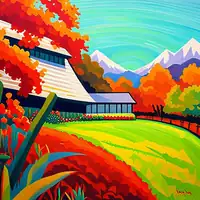
1. The National Museum of Western Art
This museum has a huge collection of Western art. You can see famous works by artists like Monet and Picasso. The building itself is stunning, designed by the famous architect Le Corbusier.
- Accessibility: Located near Ueno Station, it's easy to reach by public transport.
- Collection Diversity: Exhibits range from classical to modern Western art.
- Entry Fee: The ticket price is reasonable considering the vast collection.
- Audio Guides: Available in multiple languages to enhance the experience.
- Family-Friendly: Offers activities and programs suitable for children.

2. Tokyo National Museum
Known for an extensive collection of traditional Japanese art and artifacts. It covers Japan's history from ancient times to the modern era.
- Historical Significance: Offers insight into Japan's rich history.
- Exhibition Size: Large exhibition space with a wide range of artifacts.
- Educational Programs: Features workshops and lectures.
- Seasonal Exhibitions: Regularly updates with themed exhibits.
- Gift Shop: Sells unique traditional Japanese souvenirs and books.

3. Mori Art Museum
Located in Roppongi Hills, it showcases contemporary art from around the world. The museum also offers stunning views of Tokyo from its observation deck.
- Location: Centrally located in a bustling area with many attractions.
- Modern Focus: Features cutting-edge contemporary art.
- Observation Deck: Offers panoramic views of the city.
- Temporary Exhibitions: Regularly changes displays to showcase new art.
- International Artists: Hosts work from artists worldwide.
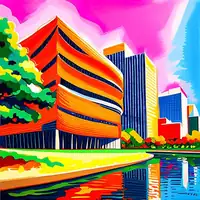
4. The National Art Center
This museum does not have a permanent collection but hosts a rotating series of exhibitions. The architecture is also a major attraction.
- Exhibition Variety: Ever-changing exhibits offer something new with each visit.
- Architectural Beauty: Iconic building design adds to the experience.
- Central Location: Easily accessible in Roppongi area.
- Spacious Galleries: Generous exhibit space provides breathing room.
- Special Events: Frequently holds cultural events and workshops.
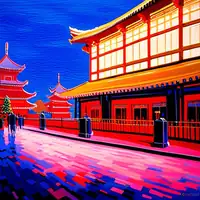
5. Edo-Tokyo Museum
Provides a fascinating look into Tokyo's past, from the days of Edo to modern times, with life-sized replicas and interactive displays.
- Historical Value: Provides a deep dive into Tokyo's history.
- Interactive Exhibits: Engaging displays for all ages.
- Cultural Insight: Offers a glimpse into the lives of Edo-era citizens.
- English Guides: Available, making it accessible to tourists.
- Event Schedule: Regularly hosts special events and exhibitions.
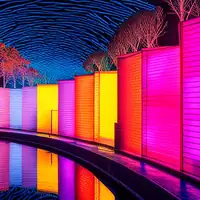
6. TeamLab Borderless
An immersive digital art museum that breaks the boundaries between artwork and visitors. You can walk through ever-changing digital landscapes.
- Interactive Art: Visitors become part of the art experience.
- Technology Used: Cutting-edge digital displays captivate audiences.
- Suitable for All Ages: Engaging for both children and adults.
- Time-flexibility: Bookings based on time slots to manage crowd.
- Photography-friendly: Unique photo opportunities in every room.

7. Sumida Hokusai Museum
Dedicated to the works of Katsushika Hokusai, an acclaimed ukiyo-e artist. The museum showcases his art and life.
- Focused Collection: Specializes in the works of one iconic artist.
- Cultural Importance: Hokusai's art is central to Japanese culture.
- Educational Content: Detailed exhibits about his life and art techniques.
- Minimal Admission Fee: Affordable entry prices.
- Regular Workshops: Offers classes in traditional art styles.
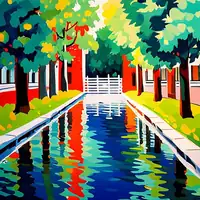
8. Nezu Museum
Known for its beautiful Japanese garden and a collection of pre-modern Japanese and East Asian art.
- Garden: Offers a serene escape in the bustling city.
- Collection: Rich variety of ancient artifacts and artwork.
- Architectural Ambiance: Traditional design paired with modern elements.
- Tea Room: Offers a traditional tea ceremony experience.
- Seasonal Blooms: Gardens change with the seasons, offering new experiences.
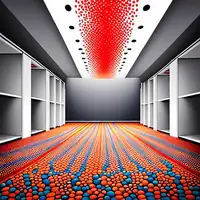
9. Yayoi Kusama Museum
A museum dedicated to the works of Yayoi Kusama, famous for her polka dots and infinity rooms.
- Dedicated Exhibit: Focus solely on one influential artist.
- Unique Style: Features Kusama's distinctive style throughout.
- Limited Entry: Reservation is a must due to limited tickets.
- Nearby Attractions: Situated near other cultural hotspots in Tokyo.
- Photography Rules: Strict guidelines, but photo opportunities in designated areas.
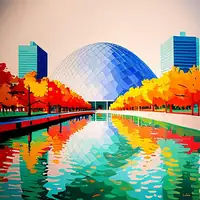
10. Ueno Royal Museum
Located in Ueno Park, this museum hosts a variety of exhibitions, showcasing both Japanese and international artists.
- Exhibition Rotation: Frequently updates with new displays.
- Location: Situated in a cultural and historical park.
- Diverse Art Forms: Includes paintings, photography, and more.
- Proximity to Other Attractions: Easy access to other museum in Ueno Park.
- Public Programs: Lectures and artist talks enhance understanding.

11. Shitamachi Tanabata Museum
Focuses on the traditional Tanabata festival with numerous historical artifacts and educational material.
- Cultural Enrichment: Offers insights into Japanese festival traditions.
- Intimate Setup: Small museum size allows a focused visit.
- Interactive Features: Offers hands-on experiences for visitors.
- Affordable Price: Low-cost entry encourages visits.
- Off-the-beaten-path: Hidden gem known by locals.

12. Bridgestone Museum of Art
Features Western and Japanese modern art, with a collection that includes works from Renoir and Monet.
- Collection Range: Mix of Eastern and Western artworks.
- Historic Pieces: Features masterpieces from renowned artists.
- Visitor Facilities: Offers amenities like a café and shop.
- Peaceful Environment: Quiet galleries ideal for contemplation.
- Central Location: Located in Tokyo's Chuo district.
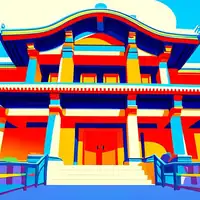
13. The Ota Memorial Museum of Art
Specializes in ukiyo-e woodblock prints, with an extensive collection highlighting this traditional art form.
- Unique Focus: Dedicated to a niche but culturally significant art style.
- Rotating Displays: Regularly changes exhibits for fresh experiences.
- English Support: Offers guides in English to aid visitors.
- Cozy Atmosphere: Intimate space enhances viewing pleasure.
- Historical Prints: Displays rare and valuable works.
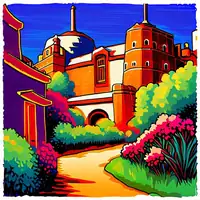
14. Ghibli Museum
A must-visit for Studio Ghibli fans, this museum offers a look at the animation process behind beloved films like "My Neighbor Totoro."
- Nostalgic Appeal: Attracts fans of Studio Ghibli's classic films.
- Thematic Design: Creatively themed rooms and displays.
- Kid-Friendly: Engages children with interactive exhibits.
- Ticket Purchase: Requires advance booking due to high popularity.
- Character Appearances: Features life-sized characters and settings.
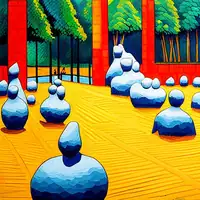
15. Asakura Museum of Sculpture
Dedicated to the works of the sculptor Fumio Asakura, showcasing a wide range of his sculptures.
- Artistic Intimacy: Focused collection provides an in-depth look.
- Garden Feature: Beautiful Japanese garden complements the art.
- Cultural Heritage: Insight into Japanese sculpture techniques.
- Off-the-beaten-path: Offers a more serene visit away from crowds.
- Preservation Efforts: Well-maintained historical building.
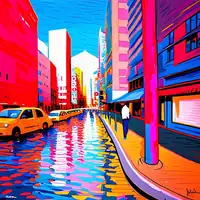
16. Tokyo Photographic Art Museum
Dedicated to photography, it offers exhibits of both historical and contemporary photographs.
- Photography Focus: Appeals to photography enthusiasts.
- International Exhibits: Displays work from photographers worldwide.
- Educational Resource: Offers workshops and talks.
- Modern Setting: Provides a sleek, modern environment.
- Archive Access: Houses an extensive photographic archive.
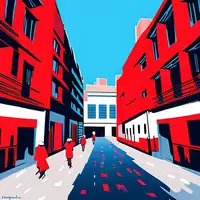
17. Mitsubishi Ichigokan Museum
Focuses on Western art from the late 19th to early 20th century, housed in a beautifully restored building.
- Architectural Charm: Building itself is a significant part of the visit.
- Historic Focus: Emphasis on a pivotal era in Western art.
- Location: Nestled in Tokyo's Marunouchi district.
- Cozy Experience: Intimate setting amidst bustling city life.
- Collection Rotation: Regular updates keep the visits fresh.
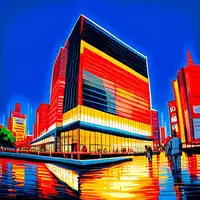
18. Toshima City Tokiwaso Manga Museum
Preserves the history of the iconic Tokiwaso apartment where famous manga artists once lived and worked.
- Manga History: Fascinating insights into the roots of manga culture.
- Local Culture: Situated near the birthplace of famous manga series.
- Recreational Area: Includes reading spots for manga enthusiasts.
- Multimedia Exhibits: Engages visitors through interactive displays.
- Affordable Entry: Low-cost access supports repeated visits.
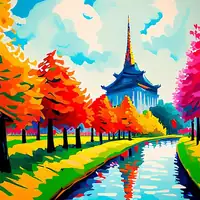
19. National Museum of Modern Art
Dedicated to modern art, it offers a comprehensive look into both Japanese and international modern art movements.
- Modern Masterpieces: Features prominent modern art collections.
- Rotating Exhibits: Regularly changing displays hold visitor interest.
- Scenic Setting: Nearby parks enhance the museum ambiance.
- Research Library: Access to extensive resources for art lovers.
- Diverse Events: Hosts special events including film screenings and talks.
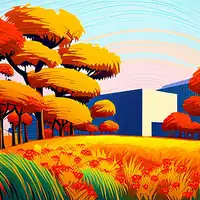
20. Idemitsu Museum of Arts
Known for its elegant presentation of traditional Japanese arts such as ceramics and calligraphy, housed atop a tall building.
- Traditional Focus: Celebrates Japan's rich artistic heritage.
- Panoramic View: Stunning views of Tokyo's skyline.
- Unique Exhibits: Features rare pieces not found elsewhere.
- Quiet Environment: Tranquil atmosphere for art appreciation.
- Lecture Programs: Offers educational talks on traditional art.